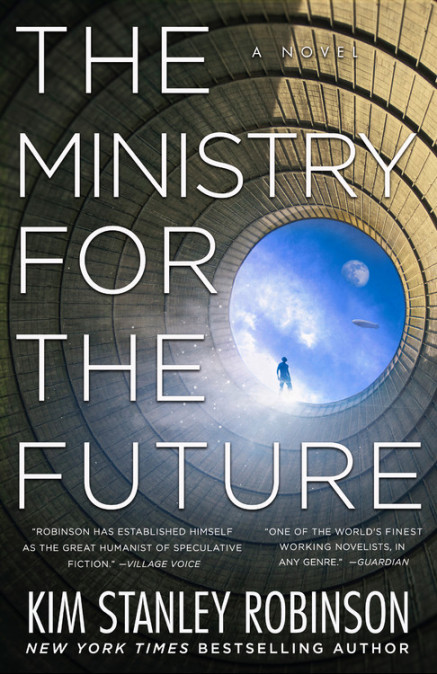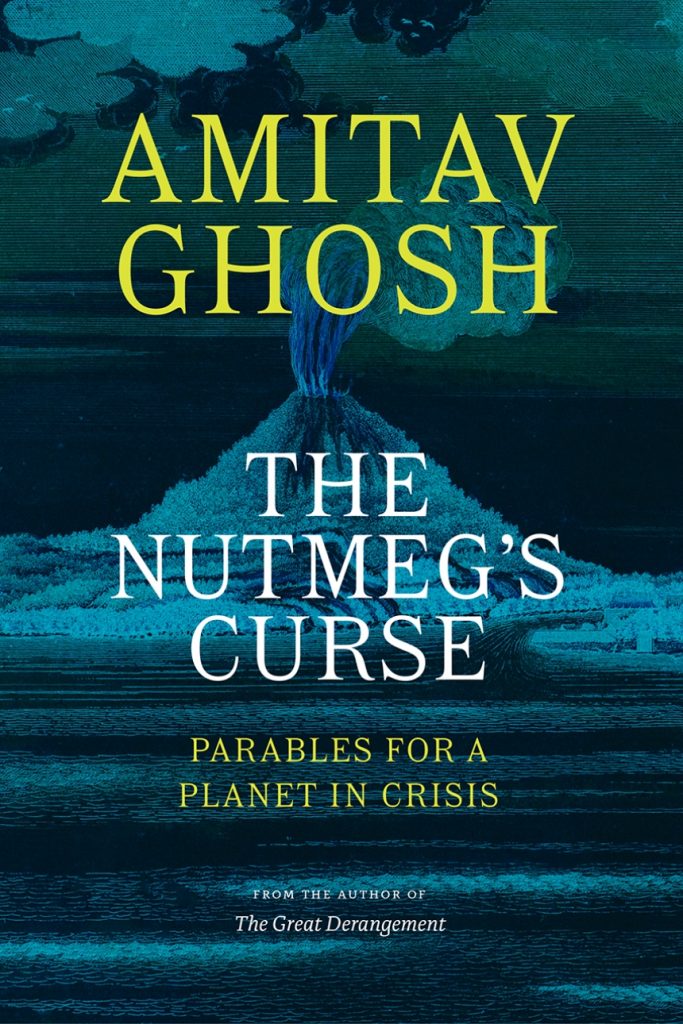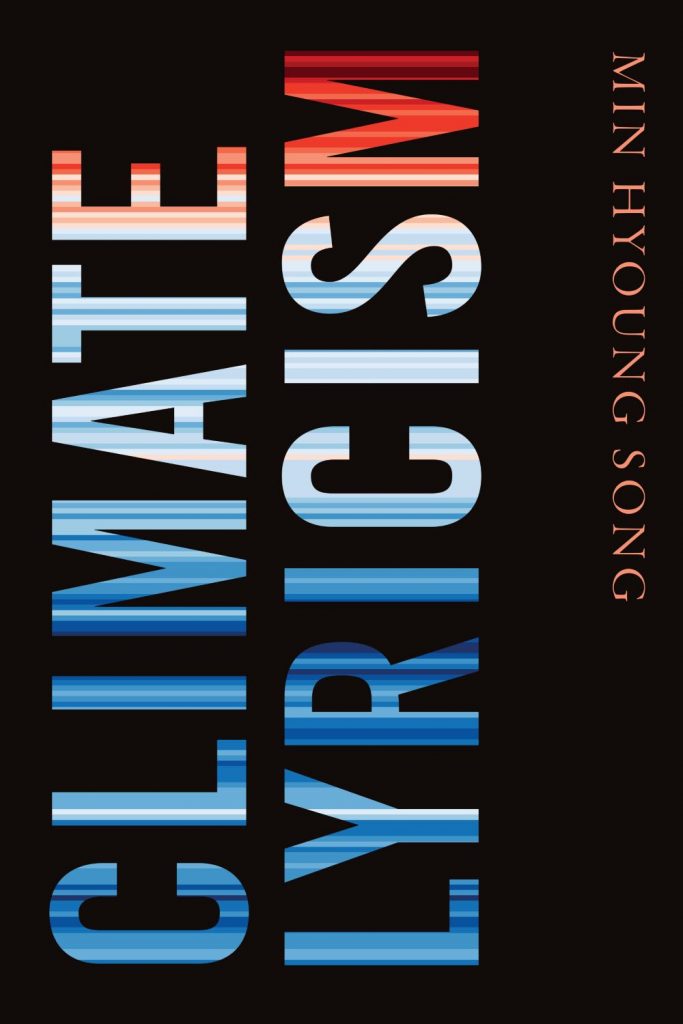Telling Climate Stories
For the month of April (Earth Month!) BC Libraries’ sustainability group GreenerLib has assembled a book display: Telling Climate Stories. We invite you to drop by the O’Neill Library lobby to browse and to check out a title of interest. A selection of titles from the display are linked below.
How do we tell human-scaled stories of processes on a scale well beyond the human?
Climate is at once too small–with numbers measured in fractions of degrees or millimeters of sea level per year–or too big–with millions of tons of carbon added to the atmosphere and millions of cubic meters of glacial ice melt annually. It’s so out of scale with human lifetimes and experience that understanding can easily slip out of our grasp.
The Great Acceleration

Quickly intensifying catastrophes like drought, storms, and flood are news- and story-ready, and perhaps help accelerate a sense of urgency. Kim Stanley Robinson, author of The Ministry for the Future, pointed out in his talk on Thursday, March 29 in Gasson Hall that “we’re living in an acceleration within an acceleration,” with a welter of events–climate change impacts, a pandemic, an invasion, and sudden leaps in AI capability–increasing the pace. He further mused that perhaps this moment is a “goldilocks” one with room for hope: the speed of change is potentially “catastrophic, but also therefore actionable,” as a looming sense of catastrophe finally becomes real enough to prompt action.
The story is about people
Journalists and artists have been struggling to tell climate stories that can encompass the disparities in scale that seem to evade many of our existing genres and forms. As Robinson put it in his talk, “the old stories that worked for thousands of years aren’t working any more.” What unites many stories is that people are at the center, causing, responding to, denying the truth of, or struggling against global warming.

Richard Powers’ approach in The Overstory is to scale multiple human stories to the lifetimes of trees, inspired partly by the groundbreaking work of Suzanne Simard establishing that trees communicate and pass nutrients via complex networks of roots and mycorrhiza. In The Nutmeg’s Curse: Parables for a Climate in Crisis, Amitav Ghosh, who spoke on this topic at BC in February 2020, explores how the colonial trade in spices evolved to the current trade in oil, taking climate change’s ideological roots back to the European age of exploration. Elizabeth Kolbert in Field Notes From a Catastrophe: Man, Nature, and Climate Change scales the story to communities in the Arctic already living with changes disrupting lives and cultural practices that had been stable through generations. Likewise, in the film Beasts of the Southern Wild, screenwriter and director Benh Zeitlin tells the story of a poor community in Louisiana already living lives disrupted by the Gulf of Mexico’s inexorably advancing inundation of their jerry-rigged settlement. Karen Russell sets a magic realist short story in Orange World–”The Gondoliers”–in a future Miami submerged under the Atlantic: two sisters in a gig economy of hand-powered water taxis, use complex songs to navigate between decaying buildings jutting from the water.
We know dystopia
Science fiction and apocalyptic and dystopian fiction are some of the few genres that had already been exploring world-scale disasters before climate change was making news. Amitav Ghosh makes a case in The Great Derangement that other literatures were late to the table. And we need updated stories: many of the assumptions of apocalyptic and dystopian fiction don’t ring true to the pandemic, a story dominated less by forbidding landscapes and brute survival than by ordinary lives beset by loss, isolation, and separation, but also stories of overcoming and reuniting. And normalizing. And denying. And avoiding. Until now, few people had Half-the-Country-Denies-an-Ongoing-Pandemic on their Dystopian Bingo cards, but Octavia Butler did in The Parable of the Sower. Writers know something, because these themes are as old as humanity. Only the climate is new.
Denial is more than a river in Egypt

How do we tell stories about an event so slow and vast that paired with the very human reactions of denial and avoidance it becomes spongy with doubt: Is it even happening? Were hurricanes Katrina, Irene, Maria, Harvey, Michael, or Ian caused or intensified by climate change? When people deny a currently unfolding acute catastrophe like a pandemic, how can we expect people to acknowledge something as slow as climate change? Are the characters who ignore the toxic event in Don DeLillo’s White Noise insane, or just like us? BC English Department Chair Min Song, in Climate Lyricism, finds a place for literature in the climate crisis: not just literature about climate per se, but literature about human foibles like denial, not always conscious, but always “a constant choosing, a turning away from the world as it is”, exemplified by the character Kathy H in Kazuo Ishiguro’s Never Let Me Go.
How do we live now?
Most of us are all still waking up, driving to work, buying groceries, and walking the dog. Is this what the apocalypse looks like?
How do we tell stories that shake people out of denial without inadvertently frightening them back into denial? Is there a place for hope? To keep on going, it takes faith. We need to believe Rebecca Solnit that It’s Not Too Late.
I hope you can take a moment to browse the titles we’ve assembled in the O’Neill Library lobby, and come away with new ideas for how to tell stories about people responding to accelerating changes.
The author would like to thank colleagues in GreenerLib for their title suggestions, and also Min Song of the English Department who offered his environmental humanities syllabi and other book lists for suggested titles.